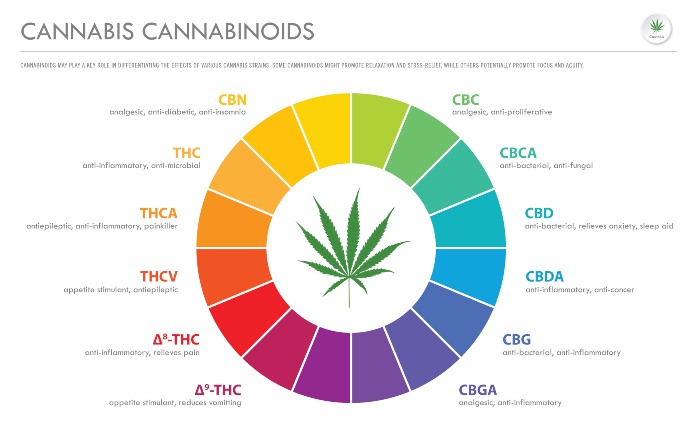

If you check out CBD products these days, you may notice some strange letters like CBN and CBG. While you may think it is a mistake during the labeling process, it represents short-form names of other cannabinoids that sprung into the market in light of CBD’s rise in popularity. CBN stands for cannabinol, while CBG is cannabigerol.
This goldmine of cannabinoids demonstrates a slew of intriguing therapeutic benefits while avoiding intoxicating side effects. Below, we look into the differences between CBN and CBG regarding their benefits and abundance in the plant.
CBN is a derivative of oxidized THC, typically detected in older cannabis plants. Both immature and mature cannabis plants generate CBG, derived from the precursor Cannabigerolic acid (CBGA). When ingested individually or combined, they do not provide a euphoric high, but they have distinct effects and advantages.
A British scientist named Robert Sidney Conn is reported to have discovered CBN In 1930, making it the first known cannabinoid. CBN is formed when THC degrades in a plant following age, heat, or oxygen exposure.
A young or freshly dried cannabis plant will have a low CBN level, but the CBN content will increase as it ages. Recreational users typically dislike CBN in cannabis because its presence indicates that the product is old and stale.
CBN has some intoxicating effects and is classified as a slightly psychoactive cannabinoid. However, research demonstrates that it is just one-fourth as effective as THC. It binds to cannabinoid receptors less efficiently than many other cannabinoids, which might explain why it is only slightly psychoactive..
The following are some of the possible advantages of CBN that are currently being researched. Note that CBN research is limited for now, with just a few studies proving its benefits in humans.
CBN, a neuroprotectant, might be particularly effective. CBN was tried as a therapy for ALS in a mouse trial, and researchers discovered that it might postpone the development of the disease.
While further research on humans is needed, this shows that CBN might be a valuable weapon in the battle against ALS and other neurodegenerative diseases.
CBN enhanced the amount of food eaten by rats in experiments, indicating that it might be a potent appetite enhancer. Because some people are wary of THC intoxicating effects, CBN might be a good option for individuals who want to boost their appetite but don’t want to get high—although further study is needed.
CBN may be a potent antibacterial agent. The cannabinoid was tested on MRSA bacteria strains resistant to conventional antibiotics in lab conditions. According to the researchers, it was discovered to be a powerful antibacterial agent against these resistant strains. Experts may employ CBN in the future to treat bacterial infections that are resistant to antibiotics.
You might be surprised to see that sedation isn’t included among the medicinal advantages listed above if you’ve previously researched CBN. CBN is sometimes hailed as a potent sedative, but this reputation may be misleading. This misinformation is that people noticed older plants induce sedation and attributed this effect to CBN. However, a study found that this is likely due to a combo effect of THC and CBN.
CBG is found in minute concentrations in cannabis, usually less than 1%. Because it is scarce, manufacturers must remove it carefully from the plant, which can be costly. CBG. Despite its rarity, the cannabinoid is gaining prominence as a result of its plethora of potential advantages.
Some cannabis strains, such as White CBG and Jack Frost CBG, have more CBG than others. These cultivars are bred mainly to produce greater levels of CBG. Immature cannabis plants contain more CBG making them its primary source.
Inflammatory bowel disease is a disorder in which the colon is inflamed for a long time. The disease affects millions of individuals all over the world and is incurable. Scientists discovered the positive benefits of CBG on inflammatory bowel disease in an experimental investigation done in 2013.
Researchers discovered that CBG has pharmacological promise for the management of glaucoma in an animal investigation. Researchers gave CBG to glaucoma-affected cats and noted a decrease in ocular pressure and a rise in aqueous humor outflow, a fluid generated by the eye that controls eye pressure and supplies nutrients.
When combined with CBD, CBG outperforms CBN in terms of anxiety and anxiety-related symptoms.
CBN’s potency in comparison to CBG is unclear. In terms of binding to cannabinoid receptors, CBN is around one-tenth to a quarter of the power of THC, so it won’t make you feel high. CBG also does not give this effect.
